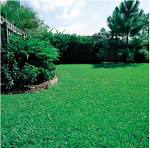 Lawns Lawns
Lawns are often discouraged by water quality organizations for several
reasons, but realistically some lakefront and other property owners
like lawns.
So to help those people who cannot do without
a lawn this page was created to provide suggestions. Lawns can be aesthetically
pleasing and provide a great place to play games including badminton
and croquet.
Ace
Hardware in Lincoln City now sells phosphorus free fertilizer.*
Environmentally
Friendly Lawn Care
Healthy Lawns, Healthy Families
The Department of Environmental Quality (DEQ)
sponsors a website with information about how to have a great-looking
lawn without using chemical fertilizers and weed killers. The DEQ Healthy
Lawns, Healthy Families site at www.healthylawns.org includes
information about how our lawn care habits influence water quality
and tips on how to practice natural lawn care. Misuse and overuse
of pesticides and chemical fertilizers on the lawn can lead to lawn
problems, and the chemicals themselves are often washed off the lawn
by rain, headed for the storm drain and ultimately to Oregon's rivers
and lakes. Once in the river or lake, the chemicals can cause problems
for fish.
National Public Radio (NPR) interviews Paul Tukey, author
of Organic Lawn Care Manual
NPR (National Public Radio) but there was an excellent article on
Talk of the Nation/Science Friday, October 2, 2009 on "green" lawns.*
The radio show was interesting and it is probably worth while getting
the book and maybe copies for every resident around the lake.
www.npr.org
www.npr.org/templates/story/story.php?storyId=113435523
______________________________________________________
Paul Tukey, author www.paultukey.com/ -
Organic Lawn Care Manual
author recommends a soil test
www.amazon.com/Organic-Lawn-Care-Manual/dp/1580176496
Amazon.com $11.38 is the lowest price I can find for new
www.safelawns.org/
www.safelawns.net/
Grass
Clippings are considered fill material, and therefore illegal to
throw in the lake. Devils Lake and the wetlands that support
it are considered Essential Salmon Habitat by the Department of State
Lands, and by being so there is zero tolerance for adding fill to
the shoreline or the lake bed. While grass clippings might
seem to pale in comparison to a truckload of rock, it would be considered
fill material, and therefore even sprinkling grass clippings on the
lake is illegal. Concerns about the ecological effects - grass is
rich in nitrogen which is fuel to weeds and cyanobacteria. Devils
lake doesn’t need anymore nutrients as development over the
last 8 decades has changed Devils Lake dramatically already. Additionally,
lawn clippings often are laden with pesticides or herbicides if the
landowner should so apply them. This is another negative impact of
dumping grass clippings in the lake.
So what is the solution? Cut the grass out of the “lakescaping” altogether.
Allow native vegetation to grow up along the shoreline which do not require
weekly maintenance of a lawn mowing, provide habitat to fish, insects, birds
and other wildlife, and protect your shore from erosion. (DLWID manager
Paul Robertson)
Composting
Purchase a composting container from North Lincoln Sanitary, use the compost
for grass clippings (do not place in the lake)
Fertilizer
Stopping the inappropriate use of fertilizers on lawns is one preventive way
to limit nutrients from seeping into the lake. Test your soil to determine
how much fertilizer is necessary for your yard, garden, or farm. Use lawn fertilizers
sparingly, and only when needed. Avoid using toxic pesticides and herbicides
on your lawn and garden - these chemicals can pollute rivers, lakes, and groundwater.
Use natural fertilizers, such as compost or manure. Ask your local hardware
and garden stores to stock them. Tossing lawn clippings in the lake is discouraged
- use a compost or leave clippings on your lawn.
Ace Hardware in Lincoln City sells phosphorus free fertilizer.
Master
Gardeners - Oregon State University Extension Service in Newport
Master Gardeners hold an annual plant sale at the Lincoln County Fair Grounds
around the third Saturday in May. Call 541-574-6534 for information about becoming
a Master Gardener or for help with your yard or visit http://extension.oregonstate.edu/lincoln/index.php
Pesticides
and Herbicides
Northwest Coalition for Alternatives to Pesticides website, www.pesticide.org
NW Coalition for Alternatives to Pesticides [mailto:info@pesticide.org]
Plants
Information about the vegetation in
the lake (aquatic) and along the shoreline (riparian area between land and
the
lake)
Trees
Lincoln
City has a tree removal protection regulation. A permit is required to cut
a tree having a trunk diameter of eight inches (approximately twenty-five
inches in circumference) or more in diameter at breast height (DBH -- the
cross sectional diameter) of the trunk of a tree when measured at a point
four and one-half feet (fifty-four inches) above the base of the trunk on
the uphill side. In the case of multi-stemmed or trunked trees, the diameter
shall be the sum of diameters of all individual stems or trunks; over a certain
diameter. Check with the planning department before cutting down a tree.
Trees are important to the Devils Lake watershed by stabilizing the soil,
providing wind breaks, wildlife habitat and noise buffers.
Turf Alternatives
Weed and
Feed
Yard
Wastes (see compost)
Do not throw cut grass and leaves in the lake.
Beyond
yard maintenance...
Boathouses, Boat Slips, Docks, Seawalls
Register your dock with the Division of State Lands. http://www.oregon.gov/DSL/LW/dockregis.shtml
Burning & alternatives
Banned in the city, burn permit required in the county.
County
residents by Devils Lake are encouraged to be kind and find alternatives
to burning - in lieu of a burn ban ordinance in the county similar
to the one adopted by Lincoln City in September 2003. Devils Lake
is not very wide, and smoke can blow across a canal or inlet or
even the lake. Part-time weekend residents and full-time residents
who burn debris may not realize that some of their neighbors have
smoke allergies, bronchitis, emphysema, asthma, or aesthetically
just do not like smoke. Burning debris can be a serious health
hazard to affected neighbors.
Some folks may not realize that permits are required from the fire
department to burn in the county, and then only certain times of
the year. Contact the fire department for a permit form and dates.
North Lincoln Fire & Rescue’s phone number is 996-2233
and burn information hotline is 996-1008.
Alternatives to burning yard debris, particularly in the Lincoln
City urban growth boundary, include:
1. Haul to the dump - North Lincoln Sanitary Service has a map
to the site, 994-5555;
2. Include the debris in your weekly garbage pickup;
3. Rent or purchase a used or new mulcher or chipper;
4. Use your debris as compost for soil conditioner - Lincoln County
Solid Waste District’s Gretchen, 265-4171 or Lincoln County
OSU Extension Service, 574-6534;
5. Haul to Toledo the first full weekend of the month - Lincoln
County Solid Waste District’s Gretchen, 265-4171 has information;
6. Contact high schoolers, youth or church groups for help;
7. Free pickup to those who want wood.
If you have any suggestions or alternatives to burning, please
contact PADL through its website at www.devilslakeor.us. Thank
you for considering your neighbors before deciding to burn.
Car
washing
Avoid washing near the lake
Car
and engine motor oil (boat
or lawnmower)
Recycle used motor oil. A single quart of motor oil poured onto
the ground can seep into groundwater and pollute 250,000 gallons
of drinking water. Do not pour oil or other chemicals down storm
drains, where they often flush directly into your favorite river,
lake, or bay. Many communities offer places to recycle used motor
oil.
Cleaning
Sweep your driveways instead of hosing them down (conserves water).
Construction
The following is from the city's Natural Resource Overlay Zone
(NR) Section 3.111
a. For in-water work the responsible party must follow the Oregon
Department of Fish and Wildlife guidelines for in-water work.
b. The responsible party may not remove native vegetation except
for that in the space occupied by the use.
c. Within six months of vegetation removal, the responsible party
must replant areas from which vegetation is removed with native
vegetation at densities at least equaling those of the removed
vegetation, unless vegetation would not allow the use to function.
d. The responsible party must keep sediment from entering the water
area.
e. The responsible party must obtain all required federal and state
permits (e.g. US Army Corps of Engineers permit, Oregon Water Resources
Department permit, Division of State Lands fill/removal permit).
Driveways,
Parking areas, Sidewalks and Walkways
Use gravel or porous materials instead of hard surfaces, sweep
surfaces instead of hosing off.
Fire
Safety
Mark your street address well so that emergency vehicles can find
your residence. Do not grow plants close to your house, leave a
buffer.
Hot tub water & laundry
water
Do not empty hot tubs into the lake. Do not run laundry water into
the lake. Grey water discharge rules apply.
Safety signs
Safety signs are available to post near a dock to inform family
and friends about the safety rules of the lake. Contact the Devils
Lake Water Improvement District (DLWID) 541-994-5330.
|
|
In
your community
Help identify, report and stop polluters. Join PADL and help monitor activities
around the lake. Local groups can be especially effective working together
with state environmental agencies, and the U.S. Environmental Protection Agency.
* Devils
Lake Water Improvement District board member Randy Weldon worked
with Ace Hardware.
* Salmon Drift Creek Watershed Council chair Paul Katen sent
NPR Paul Tukey interview link.
Organic
Lawn Care Manual has been available at the OSU Hatfield
Marine Science Center in the past.
Home
Blue
Green Thumb Watershed Education Program -
A
program of the Preservation Association of Devils Lake (PADL)
Copyright © 2003-2010 Preservation Association of Devils Lake (PADL)
All
rights reserved.

P.O. Box 36
Lincoln City, OR 97367
PADLsteward@wcn.net
www.devilslakeor.us
|

